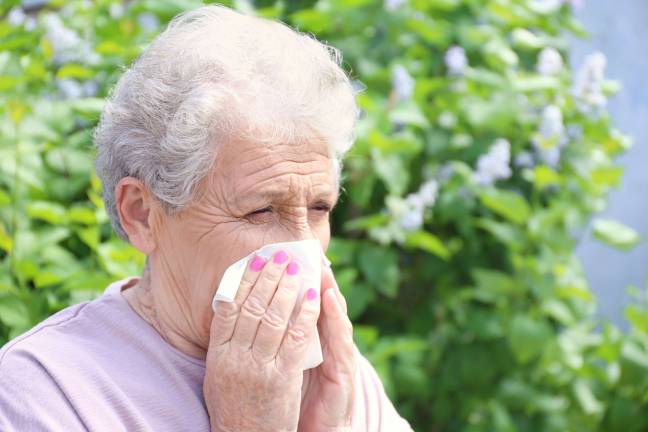when seniors start sneezing

Many people think of allergies as a problem afflicting children and young adults. It’s true that allergic rhinitis — or irritation and inflammation of the mucous membranes of the nose — most commonly begins in the earlier decades of life. That said, there is a group of adults with late-onset allergies, starting for the first time in their 50s or 60s and beyond. Many, at this age, are entering their retirement years — a time when they’d like to enjoy a walk in Central Park or play golf in the suburbs. It can be very frustrating for someone who has never dealt with allergies to suddenly be dealing with nasal congestion and post-nasal drip on a daily basis.
Allergy symptoms can be more than a nuisance: they can be distressing, and especially so in the elderly. Rhinitis causes symptoms such as stuffy nose, post- nasal drip and sneezing. Allergies can also cause itchy eyes, coughing and wheezing. Allergies can affect seniors in a major way, as they can lead to poor sleep and fatigue, which impacts quality of life. Patients have described to me feeling embarrassed by the constant need to blow their nose while dining out in NYC, or feeling self-conscious riding the bus or subway, not wanting others to think they are sick. It can be a real social burden.
Allergies are a result of the immune system overreacting to a harmless substance in the environment. Seasonal allergies happen in the spring and fall when pollen counts are high. Indoor allergens such as dust mite, dogs, cats, and mold spores can also cause allergies. In NYC we also need to consider cockroaches as a possible allergenic trigger. Environmental allergies can be a significant problem for older patients with asthma. And sometimes allergic inflammation of the nose can make us more sensitive to irritants such as tobacco smoke and strong smells.
You might think you’ve just got a cold. But when the congestion, dripping and cough continue, it might be time to consider if allergies are the cause.
So here are a few things to consider:
• Allergies in older patients are often overlooked and under-diagnosed. Older patients often have multiple medical problems and during visits, your doctor may focus on your serious medical problems, such as managing diabetes or heart problems. So allergies may not be properly assessed. Also, allergen sensitivities tend to decrease with age, with its prevalence being lower in the most advanced of ages. As such, your doctor may not be as vigilant about assessing for this issue. It’s important to speak up and share your symptoms with your doctor.
• It might not be allergies after all. In the senior age group, non-allergic rhinitis becomes a bigger issue. Structural changes of the nose can happen, such as narrowing of nasal passages due to weakening of the cartilage. This can cause nasal congestion. In addition, dryness is a very important contributing factor in this age group. In the winter months many apartment buildings blast the heat. This can dry out our skin, and the lining of our nose as well. Certain side effects of medications can also cause non-allergic rhinitis symptoms.
• It’s important to talk to your doctor and see an allergist. Testing (skin test or blood test) can be helpful in diagnosing allergies. Your doctor can also evaluate you for non-allergic rhinitis.
• When treating rhinitis medications need to be chosen carefully. Seniors may have more side effects from certain medication. First-generation antihistamines that can cause side effects like sedation are not recommended, so long-acting antihistamines may be preferable. Some over the counter medications that contain decongestants can effect blood pressure — the elderly need to be cautious. Nasal saline can be helpful in hydrating the nose. For some, allergy shots can be very useful.
You can also avoid exposing yourself to allergens by:
• Keeping windows closed, and using air conditioning instead during peak pollen seasons.
• Changing your clothes or taking a shower after spending time outdoors before entering your bedroom so you don’t track pollen into your bed!
• Making sure your pets don’t track pollen into the home and keeping them out of the bedroom.
• Using air purifiers, especially if you have pets.
• Wearing sunglasses, as this can protect your eyes from pollen in the air.
• Using dust mite protective covers for pillows and mattresses.
• Minimizing carpeting in the bedroom.
Allergies in seniors call for a personalized and specialized approach, so please work with your doctor to help alleviate your allergy symptoms.
Dr. Mauli Desai is an Assistant Professor in the Department of Medicine, The Division of Clinical Immunology at Mount Sinai.